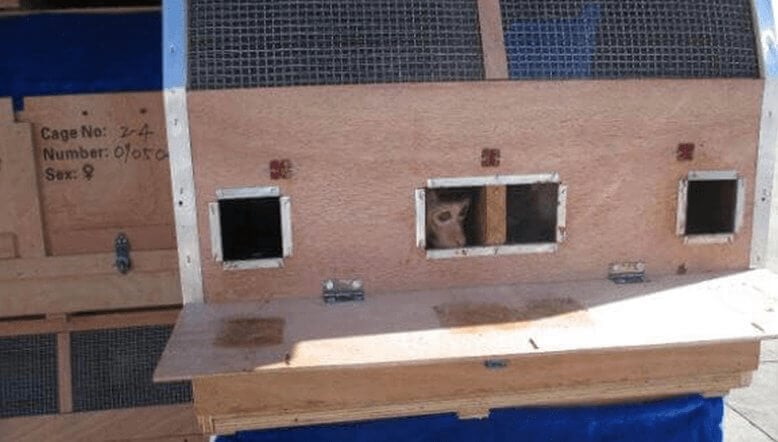PETA and a slew of animal rights organizations are calling for a federal investigation into credible allegations that Bluebird Nordic airline is not providing lab-bound monkeys with food or water during air transport and then lying on paperwork to cover it up.
After receiving the information from whistleblowers, PETA—along with Abolición Vivisección, Action for Primates, Cheshire Animal Rights Campaigns, and One Voice—sent a letter calling for an investigation by the U.S. Department of Agriculture.
If the allegations are true, Bluebird Nordic, which is one of the few airlines still willing to transport primates to laboratories, is violating federal animal welfare laws and regulations with every shipment of monkeys it carries—and multiple times for each flight, which typically lasts around 35 hours.
For transport of that length, federal law requires Bluebird Nordic to offer food at least once to monkeys more than a year old and at least twice to monkeys less than a year old, in addition to offering all of them water every 12 hours.
That includes Bluebird Nordic’s flight BO317 on September 15, which departed from the island nation of Mauritius—off the southeastern coast of Africa—and was reportedly transporting long-tailed macaques destined for Charles River Laboratories.
The flight made a total of five stops: Jeddah, Saudi Arabia; Brussels; Keflavik, Iceland; Boston; and Houston. The ordeal lasted over 35 hours, not including the loading and unloading time. PETA received information that the shipment contained 147 crates of monkeys, a likely total of several hundred terrified and suffering individuals.
An October 20 shipment on the same plane required four stops after departing Hanoi, Vietnam: Delhi, India; Tbilisi, Georgia; Reykjavík, Iceland; and Washington, D.C. According to documents obtained by PETA, this shipment contained 720 long-tailed macaques exported from Thanh Cong Biological Creature Co. and imported by Charles River Laboratories.
On December 9, a shipment from Hanoi arrived in Houston after more than 38 hours and five stops.
And if Bluebird Nordic isn’t providing the monkeys with food and water, it’s a safe bet that it’s also not observing them every four hours or at each refueling stop as regulations require.
It’s particularly concerning that Bluebird Nordic isn’t checking on the monkeys it transports, given the significant increase in the number of confirmed tuberculosis (TB) cases among them on shipments from both Mauritius and Southeast Asia. And the U.S. Centers for Disease Control and Prevention (CDC) doesn’t require any testing for disease before the animals are crammed into cargo holds bound for U.S. laboratories.
In January, more than two dozen long-tailed macaques imported from Southeast Asia were found to be infected with a strain of TB that had never been seen before in animals in the U.S.
Monkeys torn away from their forest homes in Mauritius were transported into the U.S. and quarantined under CDC rules—and then exited CDC quarantine infected with TB. They were then trucked across the country, ultimately triggering a reportable disease outbreak in Michigan this year after laboratory workers were exposed to infected animals.
Jamming stressed, immunocompromised monkeys from areas with known cases of TB into an aircraft for 35 hours amplifies the health risk not only for them but also for all the other monkeys and humans they encounter each step of the way on their hellish trip to laboratories.
What You Can Do
Please TAKE ACTION today and urge Bluebird Nordic to stop shipping monkeys to laboratories:
The post Hundreds of Monkeys Left Without Food or Water on Flight, Say Whistleblowers appeared first on PETA.

